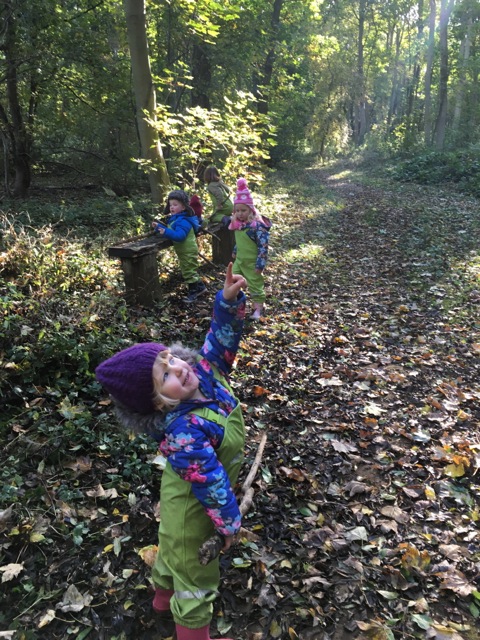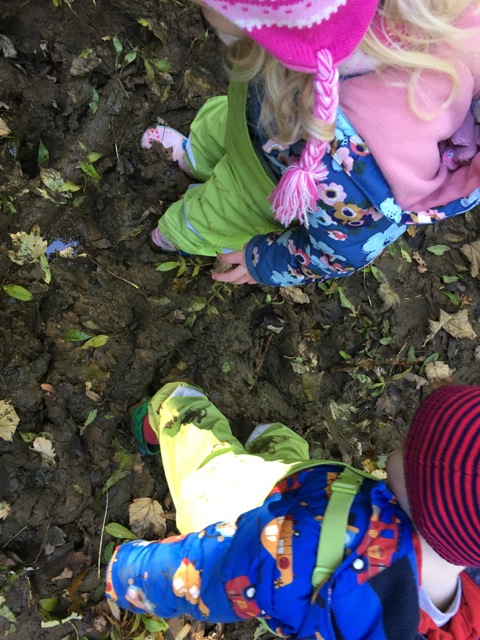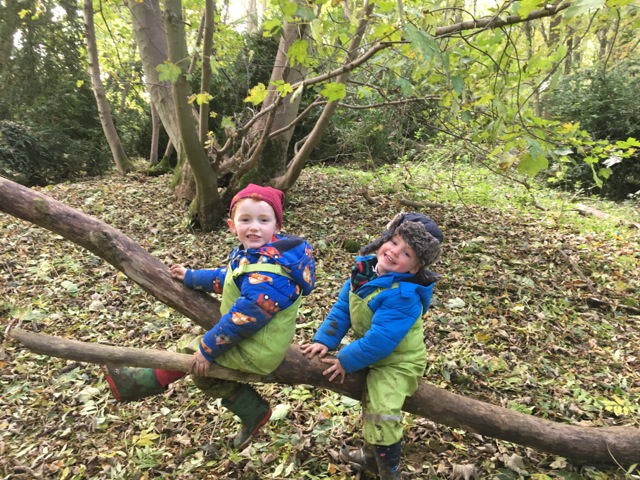Forest School Nov 7th
Posted 09/11/2016 14:11 : By: EdKenyon

Provocation. If you read the dictionary definition of this word it does not appear to be particularly positive.
However, in progressive early years education it is used to describe an incredibly positive and powerful event. This is when 'something' in the child's environment triggers a reaction for that child or a group of children which sets them on the path of discovery and learning. This is something we talked about at the Parent Discussion last week.
This is one of the key roles of our staff - to set up the internal environment in such a way that there are positive provocations for the children. The reason why we are such strong believers in the power of Outdoor Learning is that Nature can do this all on its own! This was immediately apparent from the start of this week's Forest School experience.
We arrived in the wood and, after barely two or three steps, the children were met with a carpet of leaves covering the path. This was different to all their previous experiences of walking along the very same path and so they were immediately drawn to it. There were no words of instruction by the adults. The children immediately sought out and found sticks which they thought would do the job and then they began to sweep and clear the path. First in one or two's and then all of them! They revelled in the satisfaction of their task - the swish of the leaves as they swept them aside, the forming of leaf piles, the discovery of the bare mud underneath - they were truly absorbed. Do look at the videos on Facebook to see how they took to it.

Deeper into the woods, the children came across a big dip in the path where there had previously been a large and deep puddle. Despite the recent rain, there was no puddle. There was, instead, a large patch of very sticky mud. Our immediate reaction as adults was to think of the pitfalls of this (Charlie and I discussed this). What if the children get stuck? What if they get too muddy? What if they get wet feet? We checked ourselves and allowed the children to take the lead. There was no danger for us to be concerned about. Would they be attracted by this new 'provocation'? How would they react to it?
One of the children had made their way down the path and into the mud, enjoying the sticky consistency. They prodded it with their stick. "I'm stuck!" They said. Yet cheerfully, as if being stuck was fun and exciting rather than something fearful. Sure enough, some of the other children made their way down into the quagmire. They too got stuck. Wellies were 'lost', socks were muddied, some fell over and rolled around, their waterproofs covered in brown mud. There was laughter and a great deal of chatter as they embraced the challenge of getting in and getting out. As adults, we helped where needed - replacing lost wellies and providing some physical assistance to help them in and out, yet the children engaged with this on their own terms. There was clearly something compelling for them about finding a challenging environment where they could test their own theories.
There were some sticks in the mud. The children discovered that if they stood on those then they didn't sink in. We had a conversation about why that might be and a decision was made to build a bridge across the mud with sticks. Off they went to collect sticks of all shapes and sizes and we placed them across the mud. This made it a lot easier to cross!
I have never seen the children muddier on Forest School and yet they were unfazed. Some had muddy socks. All had muddy hands. This had brought out smiles and chatter from even the quietest.
Having finally made it to our camp the children helped lay out the log benches and form the fire square. They rolled the logs and giggled as one of them rolled down a slope on its own. Over lunch Charlie and I then went through how to move and sit around a fire safely - we used a dummy fire made of different coloured leaves - and the children shared their thoughts on fires - the colours, the heat, the smoke. We then practised for the rest of the afternoon as if it was a real fire so we could gauge their level of understanding. They did tremendously well.
One of the benefits of being out in the woods for a decent length of time is that there is time for the children to follow their own interests - both individually and as a group. It allows the children to work on their communication and collaboration skills. How should they respond when someone else wants to join them in their task? What if they are drawn to something another group is doing? They are laying the foundations for these essential life skills.

And so they climbed, rolled, asked for more steps be cut into the slippy log, dug, hid, rubbed and tapped (pretending to be woodpeckers).
Charlie and I still can't work out how we all arrived back at the minibus without the need for a hosing down. The mud had somehow magically vanished!
